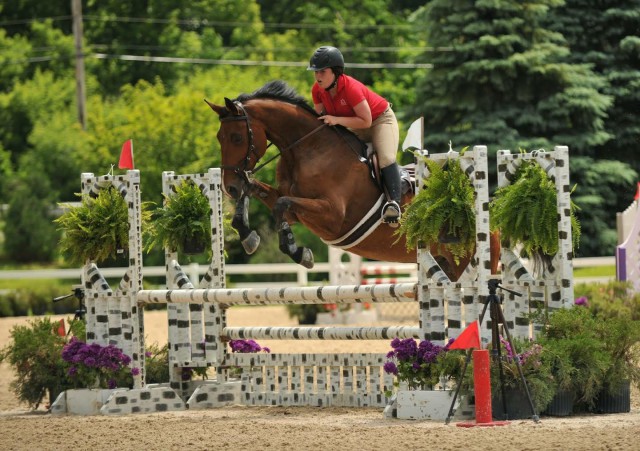Gone are the days when eventing as a young rider and going to college just didn’t mesh. After the USEA’s Intercollegiate Eventing Program became formalized in 2014, numerous colleges and universities have become affiliates and formed teams — 44 to be exact, the newest of which is Gettysburg College in Gettysburg, Pennsylvania.
Sophomore Ella Groner has headed up the process of formalizing the Gettysburg College Eventing Team by having the school registered as a USEA University Affiliate and is currently shepherding the team through the school’s approval process to have it recognized as an official club team and be eligible for funding. The eventing team is a part of the larger Gettysburg College Equestrian Team which is active on the Intercollegiate Horse Show Association (IHSA) circuit and organizes multiple activities and fundraisers for members throughout the year.
The eventing team currently has four members (out of the larger equestrian team pool of around 50 members), but Ella is eager to welcome more at any time from the existing student body or any incoming students who have been accepted and committed to the Class of 2021.
Gettysburg is located just inside the Pennsylvania-Maryland state line making it convenient to a number of different Area II events and professional event riders, giving members plenty of options to choose from as to where to train and compete.
Ella, who competed at NAJYRC in 2015, trains with Lillian Heard out of Bascule Farm in Poolesville, Maryland, about an hour’s drive from the Gettysburg Campus. As a long-time student of Lillian’s, Ella chooses to board her horse “Grafton” at Bascule Farm. Other eventers board their horses at a nearby barn about 10 minutes away from campus and trailer out to lessons with various trainers.
“A lot of the friends I have meet through the Young Rider program have decided to take gap years or just skip out on college in general,” Ella said. “I think that if people realized that it is possible to continue competing at the upper levels throughout school, then they might be more likely to attend college, or those who do attend college and might otherwise stop riding would be encouraged to continue riding and competing throughout college.”
The USEA’s Intercollegiate Eventing Program enables students from USEA Affiliate Universities to compete at Intercollegiate Team Challenges, which are held in conjunction with regular horse trials. Teams of three or four riders at any level compete for the best overall score. The program gives college students an extra reason to stay active in eventing during their academic tenure, and the team competition aspect provides valuable experience in addition to the opportunity to develop unparalleled camaraderie with one’s teammates.
Of course balancing riding with college work isn’t the easiest, but it’s still very possible. “Every college athlete has practice for two to three hours a day, and I just treat riding like that,” said Ella, who is majoring in Organization Management and double-minoring in Business and Environmental Science. “I make sure to block out time in my schedule — which I do week by week — to be certain that I have time to ride.”
“I also think it’s important to just understand that it is OK if you miss a day of riding and it isn’t the end of the world,” Ella added “School is only four years versus the whole rest of your life that you have to ride.”
The Virginia Horse Trials will again host the second annual USEA Intercollegiate Championship in May of 2017. USEA officials and college eventers alike are excited by the growth that the intercollegiate program has seen with each passing year and hope that continued growth will help strengthen the sport.
“I think that getting a college education is extremely important even if you have goals and aspirations of being a professional rider. One of the things I hear the most from people is ‘you won’t use your degree as a rider,’ which I don’t think is necessarily true,” Ella said.
“The skills you learn at college are not just the academic skills, but the people skills; how to interact with people, how to manage time properly — things like that come in handy no matter what career path you choose.”





















